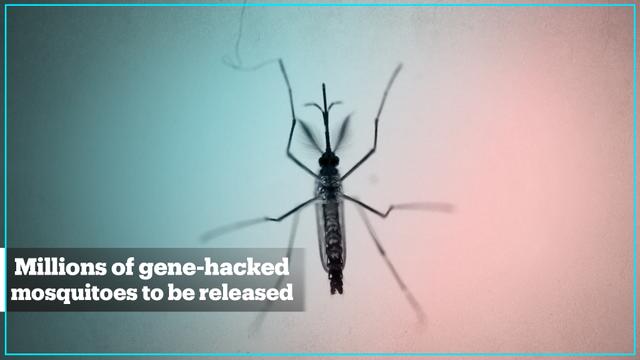
First genetically modified mosquitoes released in the United States
Biotech firm Oxitec launches controversial field test of its insects in Florida after years of push-back from residents and regulatory complications.
After a decade of fighting for regulatory approval and public acceptance, a biotechnology firm has released genetically engineered mosquitoes into the open air in the United States for the first time. The experiment, launched this week in the Florida Keys — over the objections of some local critics — tests a method for suppressing populations of wild Aedes aegypti mosquitoes, which can carry diseases such as Zika, dengue, chikungunya and yellow fever.
Oxitec, the firm based in Abingdon, UK, that developed the mosquitoes, has previously field-tested the insects in Brazil, Panama, the Cayman Islands and Malaysia.
But until now, owing to a circuitous series of regulatory decisions and pushback from Florida residents (see ‘A long road’), no genetically engineered mosquito had been trialled in the United States — even though the country previously allowed tests of a genetically engineered diamondback moth (Plutella xylostella) in New York and an engineered pink bollworm (Pectinophora gossypiella) in Arizona, both developed by Oxitec. “When something new and revolutionary comes along, the immediate reaction of a lot of people is to say: ‘Wait.’,” says Anthony James, a molecular biologist focused on bioengineered mosquitoes at the University of California, Irvine. “So the fact that [Oxitec] was able to get the trial on the ground in the United States is a big deal.”
Experiment launched
Aedes aegypti makes up about 4% of the mosquito population in the Keys, a chain of tropical islands off the southern tip of Florida. But it is responsible for practically all mosquito-borne disease transmitted to humans in the region, according to the Florida Keys Mosquito Control District (FKMCD), which is working closely with Oxitec on the project. Researchers and technicians working on the project will release bioengineered male Aedes aegypti mosquitoes, which don’t bite, to mate with the wild female population, responsible for biting prey and transmitting disease. The genetically engineered males carry a gene that passes to their offspring and kills female progeny in early larval stages. Male offspring won’t die but instead will become carriers of the gene and pass it to future generations. As more females die, the Aedes aegypti population should dwindle.
FKMCD in 2010 approached Oxitec about testing its approach in the Keys, because Florida was — and still is — experiencing an increase in mosquito-borne disease. In 2009, the state began seeing cases of locally transmitted dengue, and, a few years later, locally transmitted Zika.
In late April of this year, project researchers placed boxes containing Oxitec’s mosquito eggs at six locations in three areas of the Keys. The first males are expected to emerge within the first two weeks of May. About 12,000 males will exit the boxes each week over the next 12 weeks. In a second phase later this year, intended to collect even more data, nearly 20 million mosquitoes will emerge over a period of about 16 weeks, according to Oxitec.
Genetically engineered mosquitoes are an alternative to insecticides, which are used heavily in the United States to control insect populations. This has resulted in the evolution of mosquitoes that are resistant to insecticides.





More Stories
J.D. Vance Is Trump’s Running Mate
BlackRock yanks 2022 ad featuring Trump shooter Thomas Matthew Crooks
BlackRock reveals link to failed Trump assassin